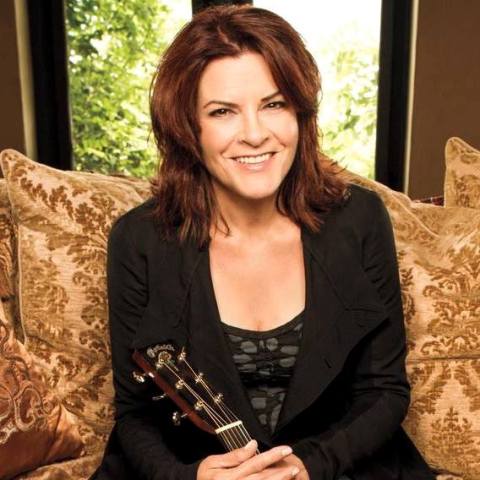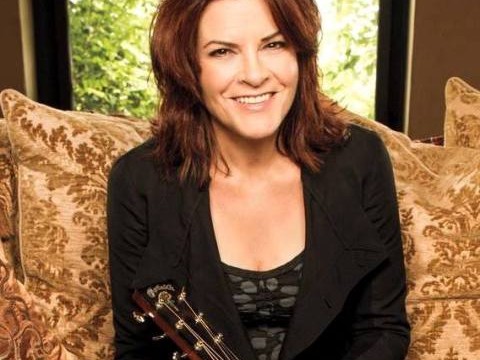By Jim Morrison
The birth of Rosanne Cash’s Grammy-winning album began with an invitation to explore her family’s roots, and, of course, a death.
This is country music, after all, real country music.
Cash’s journey commenced when she accepted an invitation to travel to Dyess, Arkansas, to work with Arkansas State University on a project purchasing her father’s boyhood home, a cottage in a New Deal colony where the Cash family worked 40 acres and a mule.
On her first trip in August 2011 to play a fundraiser with George Jones and others, she hung out with Marshall Grant, the bass player for Johnny Cash and the Tennessee Two whom she’d known her entire life, someone she’s called a surrogate dad after her father’s death. Grant came to rehearsal, lugging along his big stand-up bass and later they met in the hotel lounge. When Grant and his wife, Etta, went upstairs, Cash turned to her husband and musical partner, John Leventhal, and said “There’s something wrong with Marshall.”
Grant suffered an aneurysm that night and died a few days later. Cash remained and comforted Etta, his wife of 63 years. Every day, she told Cash, the couple awoke and said to each other, “What’s the temperature darling?”
Cash told Leventhal she thought that was a sweet day to start the day. “It’s also the first line of a song,” he replied.
The first song they wrote for “The River and the Thread,” her Grammy winner, was “Etta’s Tune.” It set the template for their journey.
What’s the temperature darling? I don’t stare into the past
There was nothing that we could change or fix, it was never gonna last
Now don’t stare into those photos, don’t memorize my eyes
We’re just a mile or two from Memphis in the rhythm of our minds
“When he died, I couldn’t have gone looking for that kind of heart opening,” Cash says during a long, thoughtful telephone interview from New York. “That was really the beginning.”
The beginning of an exploration of the broad landscape not only of South, but of her roots.
“At this point, everybody I know who is my age feels the same way,” says Cash, who is 59. “You want to know where you come from and who you are connected to. From the most simple tracing back your name to the most complex of what sticks to your DNA over eternity. The musical lineage I have. The emotional and spiritual lineage I have. What my kids will get from that. All of those questions become really important. They certainly did for me.”
So “The River and The Thread” is a concept album, a concept album that this year won three Grammy Awards, the same number as three one-name superstars — Beyoncé, Beck and Pharrell. It explores the history and musical heritage of the South through the eyes of a series of characters and, of course, through the eyes of Cash, who has spent the last 25 years in New York and fled Nashville for Los Angeles and London as soon as she could.
Cash won her first Grammy 30 years go for “I Don’t Know Why You Don’t Want Me,” a poppy first-person confessional of a young woman’s longing. I wondered if she thought earning three Grammys for songs about others, but also about her heritage, was a metaphor for her career. “I hadn’t thought of it in quite that way but I think that’s really fair and acute,” she says. “If you look at the work, the maturation over 30 years, and how you look up from you navel and see what’s going around in the rest of the world and also see what’s going around in the collective unconscious, the longing people have in their 50s is definitely different than the longing they have in their 20s.
“I just keep thinking about the fact that after doing this so long to get this kind of recognition at this point in my life how i can take it in so much better than I could at 30,” adds. “I can really receive it for what it is rather than receive it as some kind of gauntlet thrown or some kind of pressure.”
Writing songs is easier these days. “I know there’s a creative source that’s enduring, that’s available to me when I focus, pay attention,” she says. “It’s a sense of being larger than me. If it was jsut about me and what I could come up with, it would be boring and it would be small. It’s knowing I’m part of a creative (she pauses) source.”
She’s had more than her share of trials. Cash lost her voice twice, once to polyps and once when she had brain surgery in 2007 when doctors removed a credit-card sized portion of her skull to free her cerebellum, entrapped by her top vertebra. Her cerebellum was too low, crushing her brain stem, causing pain, fevers, and headaches.
“The River and the Thread” is a trip not only through space, but time. It’s a dialogue, an exploration of her family’s enduring relationship with the South.
That exploration fueled Cash to set aside her usual writing style, carefully observed first-person pieces. Cash is a prolific writer (and Tweeter). Her memoir, “Composed,” is an Impressionistic look at her life, not the typical tell-all. She doesn’t pretend to remember every detail and every date. She explores her inner experiences as much as she does the milestones in her life and the result is an honest look at a woman and an artist finding her way. She says she thought of the book as a song with repeating themes, like a chorus.
For her latest album, the focus was on characters.
“From the very beginning, John said you have to write third person songs. You have to include these characters,” she says. “You can’t write about just your experience although in another way that’s unavoidable. It’s filtering through me when I’m writing about other characters. At first, I resisted. I felt self conscious. I didn’t want to create characters out of thin air.”
She didn’t have to create characters. She knew them and she discovered more following the tendrils of her roots.
Cash had gotten to know Natalie Chanin, a seamstress out of Florence, Alabama, whose clothing she’d seen at Barneys and Bergdorf’s in New York. Cash herself has a sewing circle in New York that has included Steve Earle’s former wife Allison Moorer and the artist Maria Kalman. Chanin taught Cash to sew telling her, “You have to learn to love the thread.” She wasn’t speaking metaphorically, but the line become both literal and symbolic for Cash.
She visited Chanin, who took her to the Sacred Indian Stone Wall memorial and gave her that line in the Grammy winning “A Feather’s Not a Bird.” “She said that line ‘You have to love the thread,’ talking about the real thread,” Cash explains. “I couldn’t help but connect the dots.”
The dots, the threads, of her characters, are her family, and her own journey. “That searching, that restless touching down in all these places, trying to figure out what parts are home, what I take with me,” she says.
She and Leventhal began a series of pilgrimages, musical and personal. They went to Muscle Shoals, to the FAME studios. In the nearby Marriott, there’s a picture of Bobbie Gentry in a bar leaning on a piano “that’s the sexiest thing you’ve ever seen,” Cash says.
They drove down Highway 61, a big inspiration for the record, starting in Memphis and heading on to Oxford, Mississippi, and William Faulkner’s house. “John and I took a trip down Highway 61,” she says. “It all started to flow over us. It wasn’t that we went looking for it intellectually. It was really a spiritual thing.”
They stopped by the Tallahatchie Bridge, where Leventhal snapped a cellphone photo of Cash looking out over the river that became the album’s cover. They visited Dyess and the colony again.
Her grandparents had carved a hard life there, none harder than her grandmother’s life, told in sparing detail in “The Sunken Lands” on the album. She worked in the fields, raised the children, cooked the meals and did the washing. “My grandfather was not a nice man to her,” Cash says.
“She gave birth at home without electricity,” Cash adds. “You start thinking about this. I’m a modern woman. I live in New York City. What do I retain of that sense of endurance and strength and what do my children retain from that?”
Writing about her, telling her story was another catalyst for the record. ‘It just moved me so much,” she says. “It seemed more important than writing about my dad’s experience. I connected with her, a woman in that situation. I was just full of empathy for her. It’s not that I was looking for it. It’s that my heart was already open partly because of Marshall and partly because of Natalie and going down to Alabama.”
“Money Road” was the last song written, inspired by a trip to Money and the grocery store where Emmitt Till allegedly flirted with a white woman in 1955. Four days later, two white men kidnapped Till, beat him, and shot him They were acquitted by an all-white, all-male jury in a case that galvanized the Civil Rights Movement.
Leventhal and Cash were surprised how close Robert Johnson’s grave is to the Tallahatchie Bridge and to Money, Mississippi. Cash put them both in the song, a slow piano blues. Johnson is the “voice we’ll never understand” and Till is “a lonesome boy in a foreign land.” “Neither one got very far, out on Money Road,” Cash sings.
But the album is not a novel and part of its genius lies in the sound, the enduring sounds of the Delta, the South, and Americana. “What the lyrics hang on musically is half the picture, if not more, Cash says. “The nod to all of those forms that are so powerful, so American: Delta blues, Appalachian, Southern gospel, country pop, folk. All of that. It’s really ours. ”
Leventhal wrote the music and Cash wrote the lyrics with a little help Her ex-husband, Rodney Crowell collaborated on “When the Master Calls the Roll,” a song set in Virginia. They recorded it in Crowell’s Nashville studio. He invited a couple of buddies — Kris Kristofferson, John Prine and Tony Joe White — in for the sessions. White at first declined to sing, but eventually couldn’t resist.
Cash often visited the homestead of her stepmother, June Carter Cash, near Hiltons called Macey Springs. “That spot in the mountains where my stepmother was from is so special,” she says. The song was sparked by her son, Jake, doing a Civil War project. They looked up ancestors in the Civil War database and found Cash’s on both sides, including a picture of William Cash. It turns out all the Cash ancestors are from Virginia and settled in Westmoreland County before heading South.
“The last four lines came to me one day and it was so moving, I started crying,” she says. “I never took sides in teh song. We didn’t want to make it pro Confederate or pro Union. I was talking to my daughter about it and she said, you know Virginia went both ways, it was split (into West Virginia). That was perfect.”





